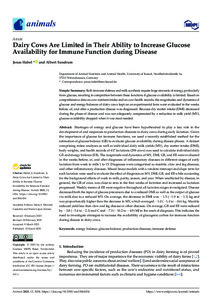| dcterms.abstract | Simple Summary
Both immune defense and milk synthesis require large amounts of energy, particularly from glucose, resulting in competition between these functions if glucose availability is limited. Based on comprehensive data on cow nutrient intake and on cow health records, the magnitudes and dynamics of glucose and energy balances of dairy cows kept on an experimental farm were evaluated in the weeks before, of, and after a production disease was diagnosed. Because dry matter intake (DMI) decreased during the phase of disease and was not adequately compensated by a reduction in milk yield (MY), glucose availability dropped when it was most needed.
Abstract
Shortages of energy and glucose have been hypothesized to play a key role in the development of and responses to production diseases in dairy cows during early lactation. Given the importance of glucose for immune functions, we used a recently established method for the estimation of glucose balance (GB) to evaluate glucose availability during disease phases. A dataset comprising ration analyses as well as individual daily milk yields (MY), dry matter intake (DMI), body weights, and health records of 417 lactations (298 cows) was used to calculate individual daily GB and energy balance (EB). The magnitude and dynamics of MY, DMI, GB, and EB were evaluated in the weeks before, at, and after diagnoses of inflammatory diseases in different stages of early lactation from week in milk 1 to 15. Diagnoses were categorized as mastitis, claw and leg diseases, and other inflammatory diseases. Mixed linear models with a random intercept and slope term for each lactation were used to evaluate the effect of diagnosis on MY, DMI, GB, and EB while accounting for the background effects of week in milk, parity, season, and year. When unaffected by disease, in general, the GB of cows was close to zero in the first weeks of lactation and increased as lactation progressed. Weekly means of EB were negative throughout all lactation stages investigated. Disease decreased both the input of glucose precursors due to a reduced DMI as well as the output of glucose via milk due to a reduced MY. On average, the decrease in DMI was −1.5 (−1.9 to −1.1) kg and was proportionally higher than the decrease in MY, which averaged −1.0 (−1.4 to −0.6) kg. Mastitis reduced yield less than claw and leg disease or other diseases. On average, GB and EB were reduced by −3.8 (−5.6 to −2.1) mol C and −7.5 (−10.2 to −4.9) MJ in the week of diagnosis. This indicates the need to investigate strategies to increase the availability of glucogenic carbon for immune function during disease in dairy cows. | eng |


